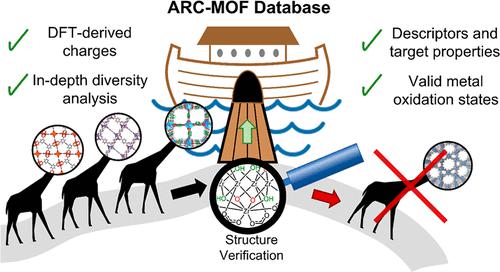当前位置:
X-MOL 学术
›
Chem. Mater.
›
论文详情
Our official English website, www.x-mol.net, welcomes your feedback! (Note: you will need to create a separate account there.)
ARC–MOF: A Diverse Database of Metal-Organic Frameworks with DFT-Derived Partial Atomic Charges and Descriptors for Machine Learning
Chemistry of Materials ( IF 8.6 ) Pub Date : 2023-01-20 , DOI: 10.1021/acs.chemmater.2c02485 Jake Burner 1 , Jun Luo 1 , Andrew White 1 , Adam Mirmiran 1 , Ohmin Kwon 1 , Peter G. Boyd 1 , Stephen Maley 1 , Marco Gibaldi 1 , Scott Simrod 1 , Victoria Ogden 1 , Tom K. Woo 1
Chemistry of Materials ( IF 8.6 ) Pub Date : 2023-01-20 , DOI: 10.1021/acs.chemmater.2c02485 Jake Burner 1 , Jun Luo 1 , Andrew White 1 , Adam Mirmiran 1 , Ohmin Kwon 1 , Peter G. Boyd 1 , Stephen Maley 1 , Marco Gibaldi 1 , Scott Simrod 1 , Victoria Ogden 1 , Tom K. Woo 1
Affiliation

|
Metal–organic frameworks (MOFs) are a class of crystalline materials composed of metal nodes or clusters connected via semi-rigid organic linkers. Owing to their high-surface area, porosity, and tunability, MOFs have received significant attention for numerous applications such as gas separation and storage. Atomistic simulations and data-driven methods [e.g., machine learning (ML)] have been successfully employed to screen large databases and successfully develop new experimentally synthesized and validated MOFs for CO2 capture. To enable data-driven materials discovery for any application, the first (and arguably most crucial) step is database curation. This work introduces the ab initio REPEAT charge MOF (ARC–MOF) database. This is a database of ∼280,000 MOFs which have been either experimentally characterized or computationally generated, spanning all publicly available MOF databases. A key feature of ARC–MOF is that it contains density functional theory-derived electrostatic potential fitted partial atomic charges for each MOF. Additionally, ARC–MOF contains pre-computed descriptors for out-of-the-box ML applications. An in-depth analysis of the diversity of ARC–MOF with respect to the currently mapped design space of MOFs was performed─a critical, yet commonly overlooked aspect of previously reported MOF databases. Using this analysis, balanced subsets from ARC–MOF for various ML purposes have been identified, with a case study of the effect of training set on the ML performance. Other chemical and geometric diversity analyses are presented, with an analysis on the effect of the charge-assignment method on atomistic simulation of the gas uptake in MOFs.
中文翻译:

ARC–MOF:具有 DFT 衍生的部分原子电荷和机器学习描述符的金属有机框架的多样化数据库
金属有机框架 (MOF) 是一类晶体材料,由通过半刚性有机连接体连接的金属节点或簇组成。由于其高表面积、孔隙率和可调性,MOF 在气体分离和储存等众多应用中受到了极大的关注。原子模拟和数据驱动方法 [例如,机器学习 (ML)] 已成功用于筛选大型数据库并成功开发用于 CO 2 的新实验合成和验证MOF捕获。要为任何应用程序启用数据驱动的材料发现,第一步(也可以说是最关键的)是数据库管理。这项工作介绍了 ab initio REPEAT charge MOF (ARC–MOF) 数据库。这是一个包含约 280,000 个 MOF 的数据库,这些 MOF 已通过实验表征或计算生成,涵盖所有公开可用的 MOF 数据库。ARC-MOF 的一个关键特征是它包含密度泛函理论推导的静电势,适合每个 MOF 的部分原子电荷。此外,ARC–MOF 包含用于开箱即用的 ML 应用程序的预计算描述符。对当前映射的 MOF 设计空间的 ARC-MOF 多样性进行了深入分析,这是先前报告的 MOF 数据库的一个关键但通常被忽视的方面。使用此分析,已经确定了用于各种 ML 目的的 ARC-MOF 的平衡子集,以及训练集对 ML 性能影响的案例研究。介绍了其他化学和几何多样性分析,并分析了电荷分配方法对 MOF 中气体吸收的原子模拟的影响。
更新日期:2023-01-20
中文翻译:

ARC–MOF:具有 DFT 衍生的部分原子电荷和机器学习描述符的金属有机框架的多样化数据库
金属有机框架 (MOF) 是一类晶体材料,由通过半刚性有机连接体连接的金属节点或簇组成。由于其高表面积、孔隙率和可调性,MOF 在气体分离和储存等众多应用中受到了极大的关注。原子模拟和数据驱动方法 [例如,机器学习 (ML)] 已成功用于筛选大型数据库并成功开发用于 CO 2 的新实验合成和验证MOF捕获。要为任何应用程序启用数据驱动的材料发现,第一步(也可以说是最关键的)是数据库管理。这项工作介绍了 ab initio REPEAT charge MOF (ARC–MOF) 数据库。这是一个包含约 280,000 个 MOF 的数据库,这些 MOF 已通过实验表征或计算生成,涵盖所有公开可用的 MOF 数据库。ARC-MOF 的一个关键特征是它包含密度泛函理论推导的静电势,适合每个 MOF 的部分原子电荷。此外,ARC–MOF 包含用于开箱即用的 ML 应用程序的预计算描述符。对当前映射的 MOF 设计空间的 ARC-MOF 多样性进行了深入分析,这是先前报告的 MOF 数据库的一个关键但通常被忽视的方面。使用此分析,已经确定了用于各种 ML 目的的 ARC-MOF 的平衡子集,以及训练集对 ML 性能影响的案例研究。介绍了其他化学和几何多样性分析,并分析了电荷分配方法对 MOF 中气体吸收的原子模拟的影响。



























 京公网安备 11010802027423号
京公网安备 11010802027423号